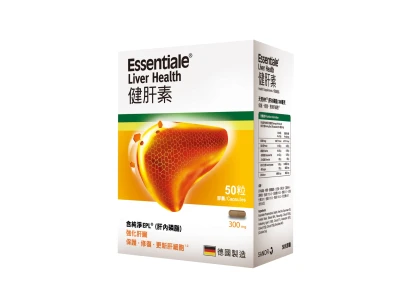
HARMFUL FACTORS FOR THE LIVER
Healthy and well-functioning livers are essential to our lives, but we often do not pay enough attention to harmful factors that can have a negative effect on our livers. Several factors can cause liver cell or hepatocyte damage, including alcohol, viruses, certain drugs, toxins in food (such as mycotoxins), heavy metals, or abnormal metabolic by-products. (1)
WE OWE A LOT TO A HEALTHY, WELL- FUNCTIONING LIVER
DRUGS AND THE LIVER
Most drugs are metabolized by the liver, where they are inactivated and detoxified. (2) Over 800 different medications and some herbal products can cause toxic liver damage. (3)
Liver damage can occur if too much is taken (poisoning). Then, side effects or an allergic reaction may occur, and even a small dose of the drug can cause severe symptoms. (3)
Factors that can lead to toxic liver damage include:
- genetic factors
- age (with increasing age, the liver breaks down harmful substances more slowly, which means that toxins and their by-products stay in the body longer),
- gender (men are more prone to the effects of certain medicines),
- nutritional status,
- taking several drugs at the same time (3)
ALCOHOL AND THE LIVER
Even regular drinking of one glass of wine or beer a day can endanger liver health. Liver problem caused by excessive alcohol consumption include:
OVERWEIGHT OR OBESITY IS NOT GOOD FOR LIVER HEALTH
Today, however, the biggest enemies of the liver are overweight and obesity, which is often caused by an unbalanced, fat-laden diet and lack of exercise. Over the last 20 years, the number of overweight and obese people has been increasing at an alarming rate. Being overweight is associated with an increased risk of metabolism issues, but also has a negative effect on liver health. (7)
Lipids and the liver
When we gain weight, excess fat (lipids) accumulates in the liver cells , leading to fattening and possible liver hurt. Non-alcoholic fat accumulation in liver is the most common liver problem in the world and its prevalence is associated with an epidemic of chronic health problem and obesity. (11)
START CARING FOR YOUR LIVER TODAY WITH ESSENTIALE®
ESSENTIALE®
Essentiale® contains 300 mg essential phospholidpids (EPL) per capsule. It is useful to protect, improve and repair liver cells/hepatocytes.
LEARN MORE ABOUT WHAT SUPPORTS AND HARMS YOUR LIVER
-
Wawrzynowicz-Syczewska M. Cirrosis del higado. Medicina Práctica. http: //gastrologia.mp.pl/choroby/watroba/50969,marskosc-watrawy - Fecha de Accceso: 22.10.2021
-
Maśliński S, Ryżewski J. Fisiopatología. Edición IV actualizada. 2009: 796–808.
-
Boroń-Kaczmarska A. Daño hepático inducido por fármacos. Medicina Práctica. http://gastrologia.mp.pl/choroby/watroba/50955,polekowe-uszkodzeniawątroby - Fecha de Acceso: 22.10.2021
-
Szymańska M, Prystupa A, Koprianiuk-Sowińska A, Schabowski J, Mosiewicz J. La enfermedad hepática alcohólica en la práctica médica. Med Og Nauk Zdr. 2011; 17 (3): 148-154
-
Schuster DP, Duvuuri V. Diabetes mellitus. Clin Podiatr Med Surg. 2002 enero; 19 (1): 79-107. doi: 10.1016 / S0891-8422 (03) 00082-X. PMID: 11806167. para esta información.
-
Informe mundial sobre la diabetes. Perfiles de diabetes por países: Polonia. Organización Mundial de la Salud 2016. http://www.who.int/diabetes/country-profiles/pol_en.pdf?ua=1 . Fecha de Acceso: 22 de Octubre, 2021
-
Kosmalski M. Hígado graso no alcohólico con diabetes tipo 2: un problema clínico subestimado, 25 de febrero de 2020 No. 21 https://www.kardiologia-i-diabetologia.pl/artykul/niealkoholowe-stluszczenie-watrawy-z-cukrzyca-typu -2-underestimated-clinical-problem . Fecha de Acceso: 22 de Octubre, 2021

